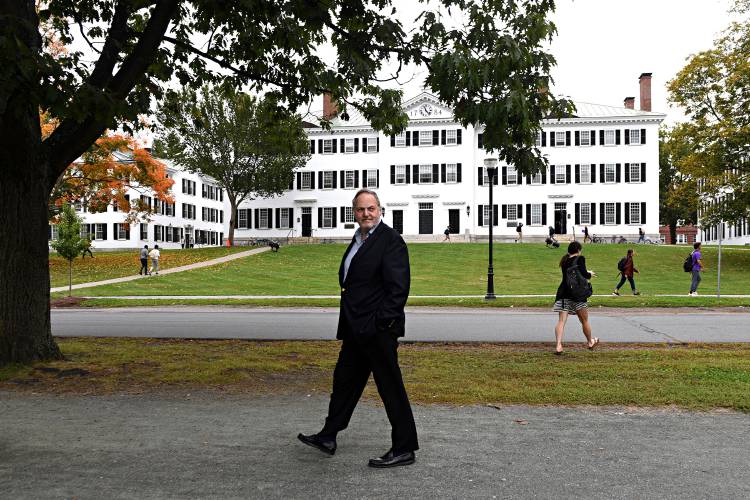
Divorces can be nasty, especially when third parties, like the uncle that you only see at Christmas time or the cousin that no one speaks to anymore decide to weigh in on the matters at hand. The marriage was the glue to the family—the host for the annual holiday events and the appeasers to the current family drama. It was safe and secure. Make the divorcees a large sovereign state and a multinational entity, and you get the picture. Brexit has shocked the world ever since the British people made their voices heard at the referendum in June of 2016.
To speak on the marriage gone awry was William Legge, the Second Earl of Dartmouth, who visited Dartmouth on September 24th. Lord Dartmouth’s talk was aimed mainly at the economic arguments for or against the separation. Before delving into that, Legge talked about the civil need for the Brexit vote. As he puts it, the growth of the European Union- in size and decision making- had created a superstate that impacted the British people. Similar to the American debates over bureaucratic size and impact, the British people were essentially tired of an unelected body presiding over daily life — especially one as seemingly isolated from the people like the European Union.
Legge argued that referendums have a history in the United Kingdom- European Union relationship. In 1975 there was a referendum on market involvement with the EU. This was when the EU still respected notions of democracy. Through the development of treaties over time, the EU devolved into what it is today.
Is it worth being in the EU for Trade benefits? Assuredly no says, Lord Dartmouth! Not only does being part of a large trading bloc make the negotiation of trade agreements more difficult as you must reconcile competing interests, but trade agreement isn’t necessary to trade, and you certainly do not need to enter a political union to do so. Further, as the share of the world economy represented by the EU decreases every year, the need to engage with them becomes increasingly redundant. Not to mention that the EU has suffered from a free-rider problem. Productive countries have felt the scourge of subsidizing fiscally failing states like Greece and Spain. The people of those states have gone to their governments asking them to sever this parasitic moment. Brexit was England’s tick removal.
Other economic arguments for the UK’s involvement have aged poorly. An increasingly raised global consciousness has consistently lowered trade tariffs since the ’90s. Such facts make the idea of a massive customs union less appealing, especially when involvement is not neutral. London, the head financial center of the UK, is subjected to extensive regulation- including the aforementioned free-rider distribution projects of the EU. Regulation in a multinational entity would be more acceptable if the UK had a say on matters somewhat proportional to their size and influence in the region. This is not the case, reflected in the UK’s representation in Belgium. Despite having the second-largest economy and third-largest population in the union having no ranking commissioners. This has been a trend, as England almost systematically relinquishes power to smaller and weaker states in the EU.
Lord Dartmouth entertained questions after the talk that walked a fine line between the political and economic arguments- something he was happy to entertain. One attendee asked the speaker if the UK’s separation from the EU would reignite issues with Ireland. Legge responded by saying that the item is inconsequential. The UK should simply not put up a border with Ireland and that Brexit does not violate the Good Friday Agreement. This agreement separated Ireland into two parts- The Republic of Ireland and Northern Ireland. It also negotiated methods of governance between the two Irelands as well as channels between the United Kingdom and the Republic of Ireland. Lord Dartmouth emphasized the point that the UK should not have a border with Ireland and that the Good Friday Agreement fails to make any mention of borders. Curious as to how the debacle would impact other English relations within the UK, another attendee asked Legge sees this affecting the Scottish Independence Movement. His response was imbued with federalist principles, “England should promise Scotland home rule over all the powers they reassume once they exit the EU.” The final question showed why you must always ensure you write down your constitution (Thanks TJ and Madison). A young man asked if Boris Johnson’s suspension of parliament was illegal. Lord Dartmouth responded with an explanation of the nebulous history of the UK Supreme Court and how it has failed to garner institutional respect. He was emphatic in his position that the ruling against Boris Johnson was another instance of institutional elites attempting to overrule the will of the people.
Where do we go from here? Who gets the kids, and who is stuck with visiting rights? That is still up in the air. More than three years later and we are only now getting some direction with this issue. Brexit suffered from lackluster leadership in the form of Theresa May. That has been purged by the stumpy figure of Boris Johnson. Johnson and his fiery rhetoric have forced people out of the comfortable tightrope walking of Theresa May and made each party show their hand. A deal or no-deal Brexit is still up for grabs, and it seems the EU will allot Britain a three-month extension on the deal deadline. This would make the due date January 31st for parliament and Johnson to reach an agreement on what a deal will look like with the EU. Whether the British people see a resolve is an issue for another day.

Be the first to comment on "Lord Dartmouth Speaks on Brexit"